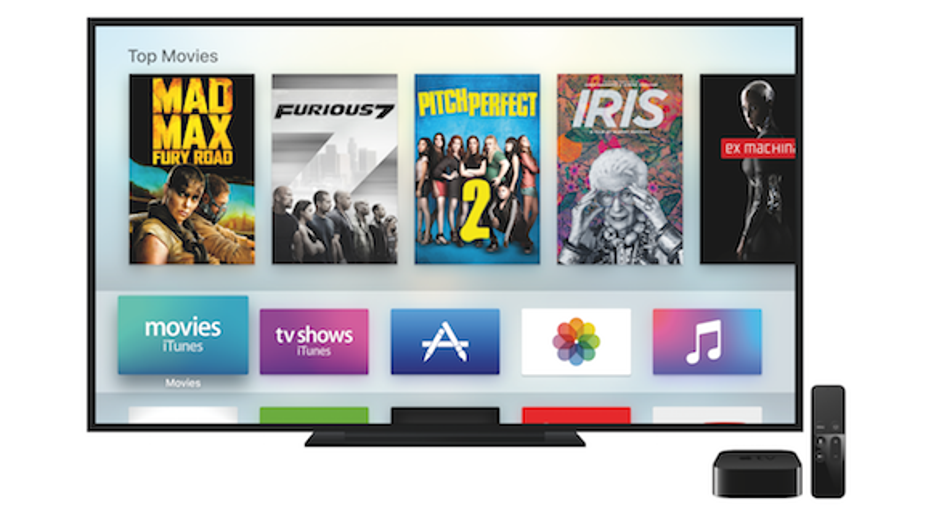Here's Why Microsoft Would Be Smart to Take On Apple TV

Image source: Apple.
Rumors resurfaced this week that Microsoft may release a smaller, cheaper version of the Xbox One in late 2016. According to the IT website Petri, Microsoft is considering a new set-top box that can play games and apps from the Windows Store, but would primarily be used for streaming video content.
Petri notes that the device would directly compete with the Apple TV. You may remember that back in 2013, Microsoft was rumored to be releasing a device like this alongside the Xbox One debut, but never did.
But I think now is the perfect time for Microsoft to dive into the set-top box space. ThoughAmazon, Google, and Roku are already firmly in the living room, a new Microsoft set top box would allow the company to compete with Apple in ways that the other competitors can't.
What Microsoft has to offerMicrosoft has already proven that it can make great hardware and software for the living room. For years, its Xbox lineup has dominated the console gaming space, and even while Microsoft stumbled with Windows 8 for PCs, its software on the Xbox hasn't received the same criticisms. And with the Xbox One (and presumably the rumored set-top box) running a version of Windows 10, Microsoft has the opportunity to bring even more cohesion to its software and hardware ecosystem.
Image source: Microsoft.
Think of how Apple pairs its devices and hardware together for a moment. The company's iPhones, iPads, Apple Watch, and computers work seamlessly together, and Apple brought that same functionality into the living with Apple TV years ago. This is exactly where Microsoft wants to go, and with Windows 10 baked into all of its devices, it makes sense to make it easy for average users (and not just gamers) to connect their televisions to a Windows 10 device.
Why this is the perfect time for MicrosoftAccording to IDC, sales of retail set top boxes overtookInternet protocol set top boxes issued by telecom companies for the first time this year. The rise of Netflix, Amazon Prime, Hulu and other content streaming sources means that more and more users are looking for additional ways to watch content in addition to -- or in place of -- their cable and satellite subscriptions.
And while over-the-top (OTT) boxes still represent a small percentage of set-top boxes in the home, their importance is growing. Consider that Time Warner Cable, one of the biggest cable and Internet providers in the U.S., is running tests using Roku players in place of some of its set-top boxes.
This doesn't mean that cable providers will be eager to hand over their content distribution to a third-party device, but if Microsoft releases its own set-top box soon, it could tap into a growing trend of OTT video users.
Microsoft needs this As Microsoft continues to build its software and hardware offerings, introducing a cheaper Xbox unit for content streaming would open up new ways to bring the Windows ecosystem into users' homes. The company talks a lot about making Windows a cohesive experience across all of its devices, and part of that will eventually mean managing a user's smart home.
Apple TV is already used as a smart home hub for the company's HomeKit system, and if Microsoft doesn't offer its own smart home automation hub soon, the company could see the smart home opportunity disappear. The smart home automation market is expected to grow from $20.3 billion in 2014 to $58.6 billion by 2020. Not all of that will come from set top box device sales, but users will soon be looking for reliable, safe, and easy-to-use smart home hubs that connect all their devices to their home automation equipment. Microsoft says Windows 10 is capable of powering all of its devices, no matter how big or small; now it's time to let it start running smart homes as well.
The article Here's Why Microsoft Would Be Smart to Take On Apple TV originally appeared on Fool.com.
Chris Neiger has no position in any stocks mentioned. The Motley Fool owns shares of and recommends Amazon.com, Apple, and Netflix. Try any of our Foolish newsletter services free for 30 days. We Fools may not all hold the same opinions, but we all believe that considering a diverse range of insights makes us better investors. The Motley Fool has a disclosure policy.
Copyright 1995 - 2016 The Motley Fool, LLC. All rights reserved. The Motley Fool has a disclosure policy.



















